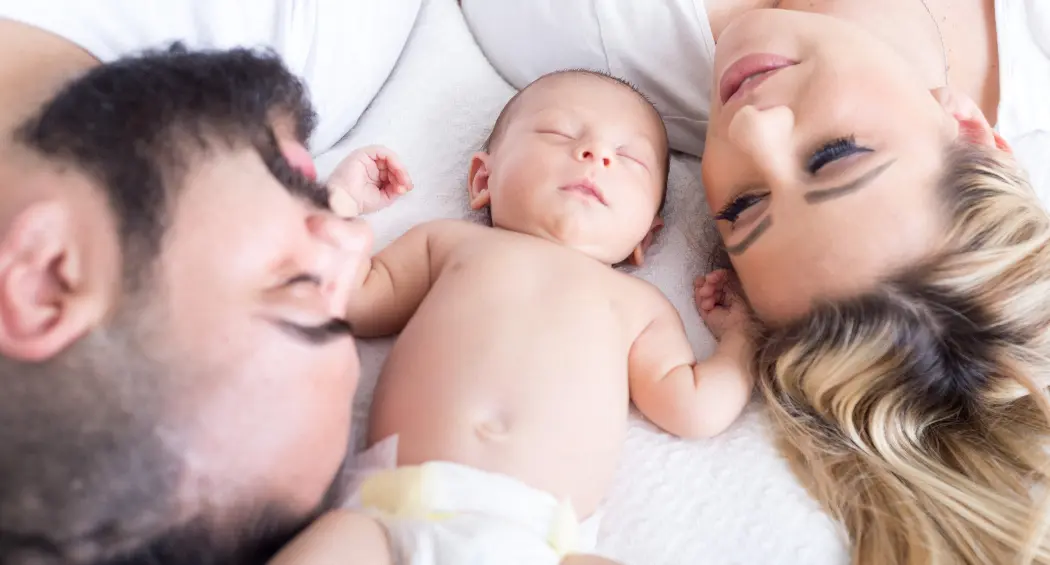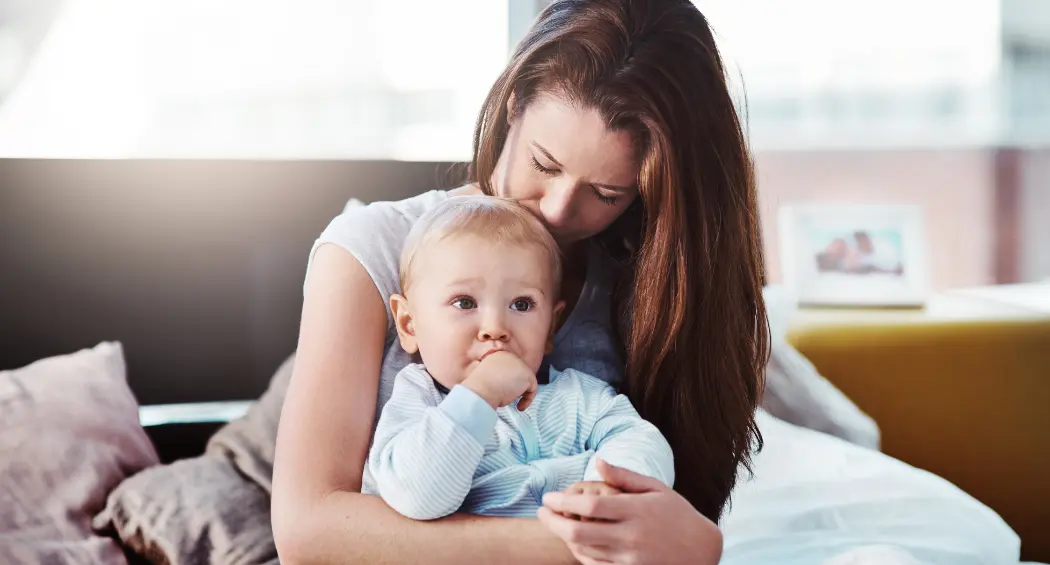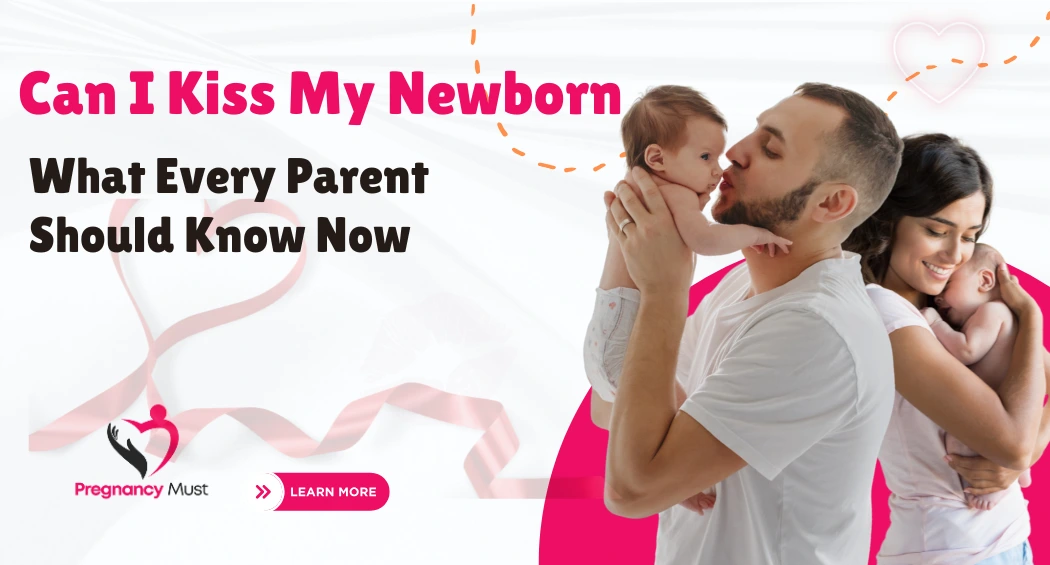An important question many new parents ask is: Can I kiss my newborn? The elation of having a newborn baby is normally dominated by lots of love and affection. You desire to kiss them, cuddle with them, and to drench eternity.
While kissing a newborn may seem like a harmless, natural act, pediatricians warn against it, especially during the first few months. This article explores when it is safe to kiss a baby, why not to kiss a newborn, and how to set healthy boundaries for visitors.

Knowing how to express love safely is beneficial in limiting anxiety, and it puts the caregivers in a better position to make necessary choices that are best suited to the well-being of their baby. The trick is to act in an informed manner that will help avoid unintended injuries. All new parents have the right to stay anxiety-free.
Table of Contents
- Why Experts Advise Caution with Kissing a Newborn
- Can I Kiss My Newborn on the Head?
- When Is It Safe to Kiss a Baby?
- Can Parents Kiss Their Newborn?
- What Is the “No Kissing Baby Rule”?
- Newborn Rules for Visitors: How to Keep Your Baby Safe
- Why Not to Kiss a Newborn? Real-Life Consequences
- Cultural Views on Kissing a Newborn
- Traditional vs. Medical Guidance
- Final Thoughts: Love Doesn’t Always Need a Kiss
Why Experts Advise Caution with Kissing a Newborn
- Immature Immune System
Infants are very helpless. At this tender age of life, the babies are still developing their body armor in the form of the immune system. They depend a lot on the antibodies delivered by their mother via the placenta or via breast milk. However, these do not suffice to protect them against salivary-transmitted viruses. That is why even some simple infections may turn into serious dangers, e.g., a cold or sore throat.
- Risk of Herpes Simplex Virus (HSV-1)
The most dangerous one is probably that of Herpes Simplex Virus Type 1 (HSV-1), which is related to cold sores. The HSV-1 is able to be transmitted by adults who have the virus and who have not developed sores yet. Kissing a baby, particularly on the lips or face, can spread the virus, thereby causing such life-threatening infections as:
- Herpes encephalitis (swelling in the brain)
- Multi-organ failure
- Sepsis
Physicians stress that HSV-1 in infants might not have vivid manifestations immediately, and preliminary identification and prevention are crucial. When the virus penetrates the inside, it may cause permanent neurochemical damage to the brain or even death. This is the reason why avoiding kissing is a minor action of defense that has a possible life-saving outcome.
- Respiratory Infections & Other Viruses
Even seemingly harmless illnesses like the flu, RSV (Respiratory Syncytial Virus), and COVID-19 can have serious consequences for babies. These viruses are often spread through saliva or close contact, making kissing a newborn a significant risk factor.
RSV, in particular, is a common cause of bronchiolitis and pneumonia in infants. It spreads quickly and can be severe enough to require hospitalization. With COVID-19 still circulating, the risk of serious respiratory illness is compounded. Practicing restraint by avoiding kisses is one of the easiest ways to keep a newborn safe during these vulnerable early weeks.
Can I Kiss My Newborn on the Head?

This is probably the most frequently asked question by parents. The quickest response: it all depends.
When It May Be Safe:
- You do not have any symptoms, you are in good health
- You never get cold sores or have experienced an outbreak of HSV-1 in the past
- Your child is more than 2-3 months old and has begun the vaccination procedures
The top of the baby’s head looks like one of the safe spots, but this is not the case; this region is not safe either. They may have small abrasions of the skin, cradle cap, or just the vicinity of their respiratory pathway can augment the possibilities of the transfer of the pathogens. It is safer to kiss without planting kisses, even on the head, before checking that you are without symptoms.
Still, proceed with caution:
- Avoid kissing the mouth, eyes, and hands
- Clean your hands and face frequently
- When in doubt, safer means of expressing affection can be utilized, such as cuddling and holding your infant child
Always remember that babies tend to rub their faces after touching other body parts. Transfer of germs to the mouth or eyes can also be an indirect cause of exposure via a simple kiss on the head, if the baby has the germs. Remembering to make interactions clean and conscious is also a great step.
When Is It Safe to Kiss a Baby?
The response would be different based on various factors like the age of a baby, his/her general health, and risk of exposure.
General Guidelines:
Baby’s Age | Safe to Kiss? | Notes |
0–2 months | ❌ Not Recommended | The immune system is weakest, and the highest risk of complications |
2–4 months | ⚠️ Cautious | Baby has received some vaccines, but is still vulnerable |
4–6 months+ | ✅ Safer | Still avoid kissing if you’re ill or recovering |
As your baby develops, he or she becomes resistant. Nonetheless, the infants in the age of 4-6 months remain vulnerable to viruses that may exhibit minimal consequences in adults. Allow only after your baby has gone through several series of vaccinations. Never attempt to make any changes without consultation with your pediatrician, particularly when your child has other underlying health issues.
Take into account other preventive strategies such as restricting attendance of crowded places, minimizing interactions with ill people, and keeping vaccinations, nurturing everyone within the family. These measures can be taken to minimize the threat and open a path to safer physical bonding.
Can Parents Kiss Their Newborn?
Yes- and within limits. The parents are mostly the caregivers, and they are always near the baby, 24 hours a day. Nonetheless, one has to:
- Be proactive and do not kiss your baby when you a sick, when you have cold sores or when you are exposed to an illness
- Wash your hands regularly
- Also, do not kiss the baby on the face and hands
- Pay particular attention, in the initial 6-8 weeks
Because parent usually serves as the first line of defense, parents have to set good examples of safe behaviors. I know the urge to kiss your child, but it is important to be careful in order not to expose your child accidentally to something harmful. Choose to kiss his forehead when you are healthy, and in case of signs of illness, do not bother with the skin. You can also strengthen your bond through regular eye contact, soft talking, gentle skin-to-skin moments, and massage. These alternatives offer comfort without compromising safety during the delicate newborn phase.
What Is the “No Kissing Baby Rule”?
The no kissing baby rule is a protective guideline supported by pediatricians. It encourages parents, family, and visitors to avoid kissing the baby—especially on the face, lips, or hands—during the first few months of life.
Who Should Follow the Rule?
- Visitors (friends, extended family, neighbors)
- Siblings (especially those attending daycare or school)
- Even parents, if they’re sick or have cold sores
The basis behind this rule is science and risk minimization. Most visitors remain oblivious of the fact that the viral infections are easily transferred even when the person has no illness. One of the most proactive measures to take to ensure the safety of your baby would be to encourage him or her to adhere to this rule. It is a respectful treatment.
Emphasize the fact that it is not about the exclusion of someone and some people; it is about making your child safe with a circle of protection. All the people going into your home need to know and understand how to maintain hygiene.
Newborn Rules for Visitors: How to Keep Your Baby Safe

When worrying whether friends or family members may ask to hold or even kiss your baby, you are not the only person. Here are some tactful ways to set boundaries:
- Set Clear Expectations
Let visitors know ahead of time:
“We’re asking everyone not to kiss the baby and to wash their hands before holding them.”
Establishing the tone at an early point prevents embarrassing discussions later. It can help to call or send a quick message to someone when he or she comes to visit. It is your baby- you have to put their health first before the comfort of another person.
- Use a Friendly Reminder Sign
You can place a sign on the door or in the nursery that reads:
“We love visitors, but please: No kissing the baby. Wash your hands before holding. Thanks for helping us keep our baby safe!”
Awesome and simple signs go like magic. It soft-sells your rules, and you do not have to explain everything to your visitor each time. One can even go to the Internet and find customizable signs that complement your nursery decor.
- Say It’s Doctor’s Orders
Blaming the pediatrician takes pressure off you:
“Our doctor told us to avoid kisses for now—it’s just a precaution.”
The reality shift using medical power takes away the aspect of personal will, looking instead at child safety. It is simple and practical to make boundaries and particularly in the family where members might hold different concepts of how to treat the baby.
Why Not to Kiss a Newborn? Real-Life Consequences
It seems to be normal to think that it will not happen to us. However, over the years, many sad tales were voiced regarding the babies contracting critical diseases due to only one kiss.
Viral Case: A 12-Day-Old Infant Hospitalized with RSV
A classic case reported many times over the internet involves a baby who was infected with RSV when he was kissed by a family member who had a mild cold. The child had been admitted to the ICU on a ventilator. The good thing is that they have survived, but not everyone.
Most of them are conveyed by parents who seek to be created. They have the message, which is quite obvious, i.e., risk is a reality, and even an innocent kiss can be disastrous. Infants would not be able to describe to us how they do not feel well, and symptoms tend to develop strongly and rapidly.
They should always be taken care of and not exposed to what they can easily avoid. Waiting a couple of weeks before kissing your baby might be a sure way of avoiding a hospitalization or worse. Risk is not worth the temporary pleasure.
Cultural Views on Kissing a Newborn
In many cultures, kissing a newborn is a cherished and traditional gesture. In certain nations, the kissing of the baby is thought by the elders to provide good fortune or blessings. Although these practices are done out of love, they may at times conflict with the current medical-related recommendations.
Traditional vs. Medical Guidance
- Traditional: Kissing is seen as a bonding or celebratory act.
- Modern Pediatric Guidance: Kissing can expose newborns to bacteria and viruses they’re not equipped to handle.
As a parent, culture may clash with health precautions and may be hard to juggle. The most important thing is to talk in a way that is respectful and train the people you love so that they understand that you are putting certain boundaries because there is something wrong.
Express your concerns in love, not fear. Stress that traditions may be observed differently, such as singing to the baby, bringing gifts, or just being together in silence. These alternatives do not leave your child vulnerable and, at the same time, enable connection.
Final Thoughts: Love Doesn’t Always Need a Kiss
So, can you kiss your newborn? Yes—but carefully and consciously. The safest way to show love in the early weeks may not involve kisses at all. Instead:
- Snuggle them skin-to-skin
- Talk, sing, and coo gently
- Hold them close with a warm, clean embrace
The best thing you can do as a parent is to protect the health of your baby. Wait it out when you are unsure. A few months of constricted sexual relations can bring a whole lifetime of joyous relationships.
and not only to be loved through physical affection. The fact that you are there, guarding them and being responsive with them, says a lot. It is a good thing to instill boundaries that are in the best interest of your child, as they will appreciate this later on.
Explore more on Pregnancy Must –
